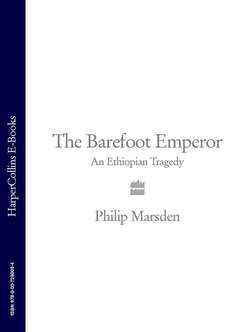Читать книгу The Barefoot Emperor: An Ethiopian Tragedy - Philip Marsden - Страница 15
Оглавление4
On the coast, Walter Plowden was living a few miles inland from the unbearable heat of Massawa. In the village of Monculu, only a little less hot, he had built himself a house from palm matting and crude timbers. From his well he dug irrigation channels so that water could flow to the roots of vegetables and fruit bushes. He nurtured shrubs for shade.
Ten years in these regions had drained a little of his old energy. He was often ill. He spent days lying on his alga, bored and feverish, while shards of sunlight pierced the fibrous walls. His treaty had yielded nothing – no exports, no imports, none of the hoped-for traffic of skills. Ras Ali had been right.
Plowden performed his consular tasks as best he could. He wrote to London with reports on slavery, on the activities of the French, on missionaries. Every quarter he drew his salary: ‘I have the honour to state that I have been at my post, and in the execution of my duties …’
But it wasn’t much. ‘I am consul in name only,’ he wrote, ‘having no consular powers, no foreign commerce, no mercantile interests, and no British subjects to protect.’
He hated Massawa. He hated its climate, its humidity and haze. He called it the ‘slave depot of Turkey’. Successive Ottoman governors had tied him down with petty restrictions, hoping to drive him and other Europeans away. The last pasha was a particular menace to the consul, who complained frequently of his ‘misgovernment, bribery and oppression’. When Plowden wanted to repair his well, the pasha told him not one stone could be moved without permission from Constantinople. Within days the leaves of his shrubs and vegetables crunched to dust between his fingers.
Whenever he was able during those years, Plowden travelled up into Ethiopia. There he breathed the mountain air, climbed beneath a puff-clouded sky to ridges where you could gaze for a hundred miles or more. He bathed in bracing streams, slept easily in the cool nights. He visited John Bell, hoping to hear that the rebels were on the run, that Ras Ali was victorious and that he might at last take up residence in the highlands.
In 1850, Ras Ali suddenly made headway. Two of his greatest enemies – Dejazmaches Kasa and Wube – fell into line behind him. When he called them to campaign on his behalf, they came running. They brought their thousands of followers. A strange peace began to settle over the country, and many believed that the years of the Mesafint might just be over.
But in January 1853 Plowden wrote to his masters in the Foreign Office: ‘One of the great vassals of Ras Ali named Dejazmach Kasa … has rebelled.’ He reassured them that ‘at present the position and power of the Ras will be in no wise endangered’.
Four months later, he reported: ‘This rebel chief has gained another decisive victory over the combined forces of Ras Ali and Dejazmach Wube.’
Two months later: ‘Dejazmach Kasa is increasing in force.’
Three days later: ‘Dejazmach Kasa has completely defeated Ras Ali.’
The tufty-cheeked mandarins of the Foreign Office were not impressed. All they’d ever heard from their consul to Ethiopia was bad news from the interior and endless squabbles with the Turkish pasha.
‘Her Majesty’s government,’ wrote the permanent secretary, ‘were led by the representations made by you to expect that advantage would result to British interests from the conclusion of a treaty with the Rulers of Abyssinia … It appears however with your reports now before me, that there is little reason to expect such will be the case.’
Plowden was forced to agree. On 10 July 1854, six years after his original appointment as consul, he asked for his first leave.
Yet even as he was waiting, a new possibility emerged. As more news came in about Kasa, Plowden began the same volte-face that others had already performed in the highlands. Dejazmach Kasa, the wrecker of peace, was becoming the bringer of peace. Plowden delayed his departure.
On 3 March 1855 he wrote to tell Lord Clarendon that Dejazmach Kasa had defeated his last enemy, Dejazmach Wube. ‘There is at last some chance that Abyssinia may be united under one Sovereign, and such an one as shall merit the support and friendship of Her Majesty’s Government.’ The more Plowden heard of the new ruler, the more excited he became. Dejazmach Kasa had already abolished the slave trade, spoken out against battlefield mutilations. He had written to Plowden himself expressing his interest in ‘a sincere friendship with Europeans, more especially the English government’. When news reached him that Kasa had been crowned, Plowden was elated. He cancelled his leave and prepared to travel inland. He had waited nearly a decade for an opportunity like this. The Ethiopians had waited rather longer, and the promise of liberal reforms and foreign relations meant less to them than Kasa’s choice of name. He had been crowned Tewodros II.
